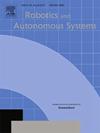Regional pole placement-based robust lateral controller for autonomous ground vehicles considering uncertainty
IF 5.2
2区 计算机科学
Q1 AUTOMATION & CONTROL SYSTEMS
引用次数: 0
Abstract
Autonomous ground vehicles (AGVs) often face challenges in maintaining tracking accuracy and stability due to uncertainties and external factors, such as variations in road surface friction and wind. These factors, particularly at higher speeds, significantly hinder the ability to achieve the desired stability and tracking performance. To address these challenges, we propose a novel robust lateral controller (RLC) by exploiting the synthesis technique, considering uncertain cornering stiffness, with linear matrix inequality (LMI)-based regional pole placement constraints (RPPC). The proposed regional pole placement constraints-based robust lateral controller (RPPC-RLC) with uncertainty is designed to be robust against variations in road conditions and external disturbances, ensuring the desired path-tracking accuracy and vehicle stability. A state-feedback control law is employed using a nonlinear vehicle dynamics model to develop LMIs as performance conditions. Additionally, we utilised RPPC technique to precisely refine the controller gain for ensuring precise stability and robust performance in the presence of uncertainties and active disturbances. The proposed controller’s effectiveness is rigorously examined under different road conditions, various AGV speeds, and both the presence and absence of wind disturbances, while cornering stiffness was considered an uncertain parameter. The performance of the controller was also compared with several commonly used controllers, such as the model predictive controller (MPC), , conventional robust controller, and the Linear Quadratic Regulator (LQR). The results demonstrate that the proposed controller outperforms these alternatives in terms of minimising the lateral position error and heading error, based on different statistical parameters. Furthermore, we validated the controller’s performance in a MATLAB/Simulink environment using a 14-degree-of-freedom complex vehicle model. Finally, the proposed RPPC-RLC with uncertainty exhibited efficient tracking performance and maintained the stability of the AGV under varying road conditions and wind disturbances at different speeds, even at high speeds.
考虑不确定性的自主地面车辆区域极点位置鲁棒横向控制器
由于不确定性和外部因素,如路面摩擦和风力的变化,自动地面车辆(agv)在保持跟踪精度和稳定性方面经常面临挑战。这些因素,特别是在更高的速度下,严重阻碍了实现理想稳定性和跟踪性能的能力。为了解决这些挑战,我们利用H∞综合技术提出了一种新的鲁棒横向控制器(RLC),考虑了不确定的转弯刚度,并基于线性矩阵不等式(LMI)的区域极点放置约束(RPPC)。所提出的基于区域极点放置约束的鲁棒横向控制器(RPPC-RLC)具有不确定性,可以对道路条件和外部干扰的变化具有鲁棒性,确保所需的路径跟踪精度和车辆稳定性。利用非线性车辆动力学模型,采用状态反馈控制律建立lmi作为性能条件。此外,我们利用RPPC技术精确地改进控制器增益,以确保在存在不确定性和有源干扰时的精确稳定性和鲁棒性能。在不同道路条件、不同AGV速度、存在和不存在风干扰的情况下,对所提控制器的有效性进行了严格检验,并将转弯刚度视为不确定参数。并与模型预测控制器(MPC)、H2、传统鲁棒控制器和线性二次型调节器(LQR)等常用控制器进行了性能比较。结果表明,基于不同的统计参数,所提出的控制器在最小化横向位置误差和航向误差方面优于这些替代方案。此外,我们在MATLAB/Simulink环境中使用14自由度复杂车辆模型验证了控制器的性能。结果表明,不确定性RPPC-RLC在不同的道路条件和风速下,即使在高速下,也能保持AGV的稳定性。
本文章由计算机程序翻译,如有差异,请以英文原文为准。
求助全文
约1分钟内获得全文
求助全文
来源期刊

Robotics and Autonomous Systems
工程技术-机器人学
CiteScore
9.00
自引率
7.00%
发文量
164
审稿时长
4.5 months
期刊介绍:
Robotics and Autonomous Systems will carry articles describing fundamental developments in the field of robotics, with special emphasis on autonomous systems. An important goal of this journal is to extend the state of the art in both symbolic and sensory based robot control and learning in the context of autonomous systems.
Robotics and Autonomous Systems will carry articles on the theoretical, computational and experimental aspects of autonomous systems, or modules of such systems.
 求助内容:
求助内容: 应助结果提醒方式:
应助结果提醒方式:


